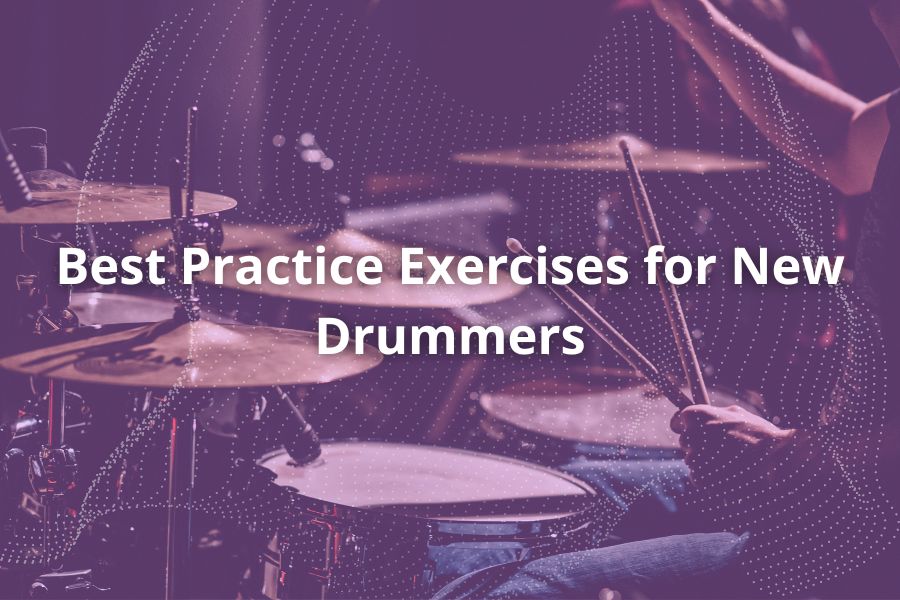So, you’ve got your sticks and a shiny new drum kit. Now what? Time to rock out! But before you throw your energy into becoming the keeper of the beat, getting a grip on some basics is crucial. The Dudes are here to help you navigate the world of beginner drum exercises and drum practice routines. With a bit of guidance and a lot of practice, you’ll be drumming like a pro in no time!
Essential Drum Rudiments Every Beginner Should Learn
Think of drum rudiments as the ABCs of drumming. There are always foundational blocks from which everything else is created. Why do these rudiments matter? They form the foundation for more complex drumming patterns and techniques. Mastering them will make you a more versatile drummer, able to tackle a wide range of musical styles.
Here are the essential rudiments every beginner should master:
- Single Stroke Roll: This is the most basic rudiment, consisting of alternating strokes (R, L, R, L). It’s perfect for developing hand coordination and speed.
- Double Stroke Roll: In this rudiment, each hand plays two consecutive strokes (R, R, L, L). It’s great for building control and evenness between your hands.
- Paradiddle: This pattern combines single and double strokes (R, L, R, R, L, R, L, L). Paradiddles are excellent for improving hand independence and accent control.
- Flam: A flam consists of a grace note followed by a primary stroke (rL, lR). It adds a powerful, accented note to your drumming.
- Drag: Similar to the flam, the drag involves two grace notes before the primary stroke (rrL, llR). It’s useful for creating a more intricate and textured drumming style.
Building a Solid Practice Routine
Nobody came out of the womb drumming like Tommy Lee. Consistent, focused practice is vital to developing your drumming skills. Here’s how to build a practice routine to set you on the path to success.
Components of a Good Drum Practice Routine
- Warm-ups: Start with some basic stick control exercises to loosen up your hands and wrists. Simple single—and double-stroke rolls are perfect for this.
- Rudiment Practice: Dedicate time to practicing the essential drum rudiments. Focus on accuracy and control before gradually increasing your speed.
- Play-along with Simple Songs: Choose songs with straightforward drum parts to practice playing in time with music. This helps improve your timing and musicality.
- Metronome Use: Practicing with a metronome fosters a strong sense of timing. Start slow and gradually increase the tempo as you become more comfortable.
Tips for Staying Motivated While Learning to Play the Drums
- Set Goals: Define clear, achievable goals for each practice session. This will give you something to strive for and help you measure your progress.
- Track Progress: Keep a practice journal to note what you worked on and any improvements. Seeing your progress over time can be incredibly motivating.
- Reward Yourself: Give yourself small rewards for hitting milestones. Whether it’s a new pair of drumsticks or a favorite snack, rewards can keep you motivated.
- Try Short, Spaced Practice: Consistency is critical. Aim to practice daily, even if it’s just for a short time. Over time, those small sessions add up to significant improvements. What’s more, long sessions have diminishing returns. Aim for a few minutes every day and stretch your practice out further on days when you’re feeling the groove
Exercises to Improve Drumming Speed and Control
Dreaming of playing those super-fast fills like your favorite drummers? Time to speed things up! Improving your drumming speed and control takes dedication and the right exercises. Here are some effective drills to help you get there:
- Stick Control Drills: Start with basic stick control exercises, such as single- and double-stroke rolls. Focus on maintaining consistent volume and evenness between your hands.
- Speed Rudiments: Practice rudiments like double-stroke rolls and paradiddles at increasing tempos. Begin slowly to ensure accuracy, then gradually speed up.
- Moeller Technique Practice: The Moeller technique is all about using a whipping motion to generate power and speed with minimal effort. Practice this technique to improve your efficiency and control.
- Foot Pedal Exercises: Don’t forget about your feet! Work on exercises that strengthen your foot technique, such as playing continuous eighth or sixteenth notes on the bass drum.
Creating Your Own Practice Space
Because even drummers need a zen space to make all that noise! Setting up a dedicated practice area can make a huge difference in your drumming journey. Here’s how to create a space perfect for productive practice sessions.
Tips for Setting Up a Home Practice Area
- Soundproofing Tips: Use rugs, foam panels, and heavy curtains to help dampen sound. If possible, choose a room that’s away from high-traffic areas to minimize disruptions.
- Choosing the Right Gear: Invest in practice pads, electronic drum kits, or low-volume cymbals to keep the noise down while you practice. These tools allow you to practice quietly without sacrificing technique.
- Ergonomics and Comfort: To avoid strain, make sure your drum kit is set up for your size. Adjust your throne height, drum angles, and pedal positions for maximum comfort.
Making Drum Practice Extra Fun
- Incorporate Music You Love: Play along with your favorite songs to keep practice enjoyable.
- Use Drumless Tracks: Find tracks without drums to practice your timing and creativity.
- Join Online Drumming Communities: Connect with other drummers online to share tips, get feedback, and stay motivated.
Common Beginner Mistakes and How to Avoid Them
We’ve all been there—smashing away on the kit, wondering why it doesn’t sound quite right. Every drummer, even the greats, started as a beginner and made their share of mistakes. Let’s look at some top mistakes new drummers make and how to avoid them, so you can fast-track your progress and sound like a pro.
- Ignoring the Basics: It’s tempting to jump straight into playing your favorite songs, but skipping the fundamentals like rudiments and proper technique can hinder your progress.
- Solution: Dedicate time in each practice session to work on rudiments and basic exercises. They’re the building blocks of all drumming.
- Overlooking Posture and Technique: Poor posture and incorrect technique can lead to injury and limit your playing ability.
- Solution: Ensure you’re sitting comfortably with good posture. Focus on holding the sticks correctly and using the proper hand and foot techniques.
- Not Using a Metronome: Timing is everything in drumming. Without a metronome, it’s easy to develop bad timing habits.
- Solution: Always practice with a metronome to develop a strong sense of timing. Start slow and gradually increase the tempo as you improve.
- Practicing Inconsistently: Infrequent practice sessions won’t yield much progress. Consistency is key to improvement.
- Solution: Create a practice schedule and stick to it. Short, daily practice sessions are more effective than long, irregular ones.
FAQ Recap (TLDR for the Extra Impatient)
- What are essential drum rudiments every beginner should learn?
- Single Stroke Roll, Double Stroke Roll, Paradiddle, Flam, Drag
- How often should new drummers practice?
- Aim for daily practice sessions, even if they’re short, to build and maintain your drumming skills.
- What exercises can help improve drumming speed and control?
- Stick control drills, speed rudiments, Moeller technique practice, foot pedal exercises
Remember, every drumming legend started where you are now. Keep at it, and soon you’ll be making music magic! Consistent practice, focusing on fundamentals, and setting up a good practice environment will set you on the path to drumming greatness. Whether you’re struggling with a particular rudiment or just want to share your latest drumming victory, we’d love to hear from you! Grab those sticks, hit the practice pad, and let’s make some noise! Happy drumming, dudes!


